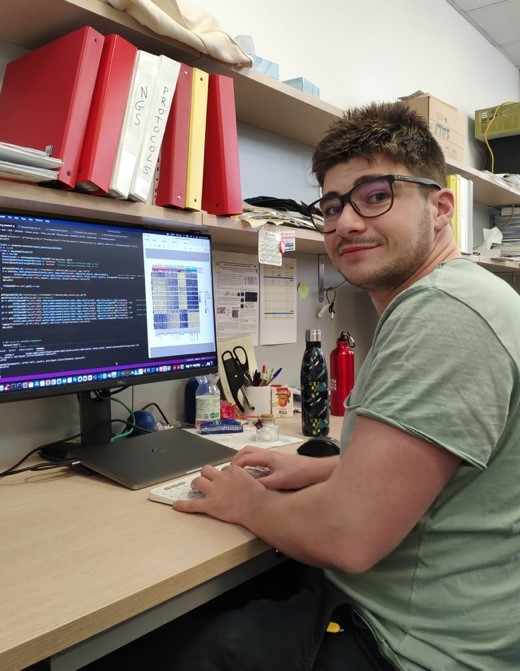WHAT IS YOUR BACKGROUND?
My first experience in cancer field was during my academic studies at the University of Bologna. I was intrigued by how cancer cells can trigger several molecular mechanisms and control their different cell behaviors. To address my passion, I decided to gain more experience in different research labs in international environments working on different areas of oncology. I had the chance to work abroad at the CIC bioGUNE in Bilbao and at the University of Birmingham where I improved my knowledge in cancer and I gained my strong interest in cancer research.
Back in Italy and thanks to Dr. Gioacchino Natoli and Dr. Giuseppe Riccardo Diaferia (co-founder of IPCC), I had the great opportunity to spend my PhD at the European Institute of Oncology (IEO) for the investigation on the different cellular components composing human pancreatic ductal adenocarcinoma tissues using high-throughput spatial transcriptomic approaches.
Recently, I won a prestigious AIRC fellowship for the study of the stromal heterogeneity in pancreatic ductal adenocarcinoma.
WHY DID YOU CHOOSE TO DO RESEARCH ON PANCREATIC CANCER?
Pancreatic cancer is associated with a poor prognosis and it is predicted to become the second leading cause of cancer mortality by 2030. Since I started to work on pancreatic cancer during my PhD studies, I realized that this remarkable aggressiveness has never been fully clarified. For this reason, I decided to keep studying this disease trying to understand why it is so deadly and the current clinical treatments are so challenging. Although this process requires strong commitment and dedication, the hope that this work will bring important results for the improvement of clinical outcomes and the life quality of patients in the near future is a great self-motivation.
WHAT IS YOUR RESEARCH ABOUT?
Pancreatic ductal adenocarcinoma is a lethal disease with an extremely aggressive behavior. The fibrotic stroma is the major component of the entire tumor volume and it is a complex and heterogeneous mixture of different cell types. Several studies highlighted that tumor-associated stromal cells can influence the tumor phenotype enhancing tumor proliferation, inhibiting the effects of chemotherapy and promoting tumor cell invasion and metastasis.
The overall aim of the project is to molecularly characterize the heterogeneous cellular components of the stromal compartment using spatial transcriptomic approaches such as laser microdissection and multiplexed in situ FISH.
WHAT ARE THE RESERCH PERSPECTIVES AND THE IMPACT OF YOUR WORK?
I expect to identify spatial domains of distinct stromal subpopulations preferentially associated with low- or high-grade tumor cells and to obtain a mechanistic understanding of their transcriptional bases in the complex context of cellular heterogeneity in human PDAC. A molecular understanding of the stromal contribution to PDAC properties will increase the current understanding of the disease and thus will enable the reassessment of the currently available therapeutic options. The identification of novel and more efficient pharmacological approaches targeting specific cellular components will lead to the reshaping of the pancreatic tumor stroma and therefore to the improvement of patient outcomes.
WHY IS IT IMPORTANT TO BE PART OF THE IPCC?
Bringing together basic and translational scientists through the Italian Pancreatic Cancer Community (IPCC) is extremely important to promote scientific exchanges and research collaborations in the field of pancreatic cancer. Science is a collective process depending on the interactions between international scientists and the exchange of different viewpoints. I think Italian Pancreatic Cancer Community is a great opportunity to gain new knowledge in pancreatic cancer and to join our forces to finally defeat this deadly disease
WHEN YOU ARE NOT IN YOUR LAB WHAT DO YOU LIKE TO DO?
I like to spend my spare time with my friends doing sport especially playing football, going out for a beer, watching movies together and so on. I love travelling to explore new places!



